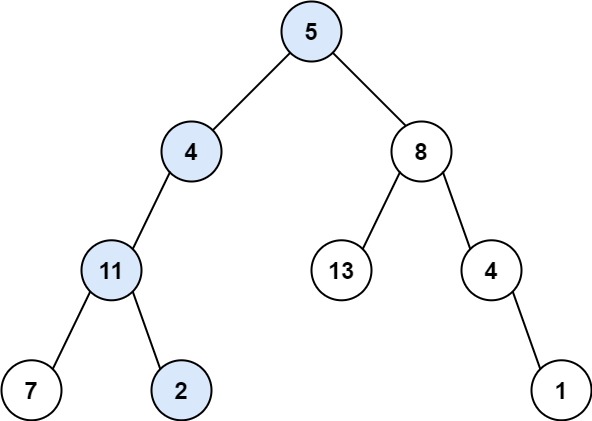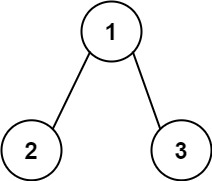Question
Given the root of a binary tree and an integer targetSum, return true if the tree has a root-to-leaf path such that adding up all the values along the path equals targetSum.
A leaf is a node with no children.
Example 1:

Input: root = [5,4,8,11,null,13,4,7,2,null,null,null,1], targetSum = 22 Output: true Explanation: The root-to-leaf path with the target sum is shown.
Example 2:

Input: root = [1,2,3], targetSum = 5 Output: false Explanation: There two root-to-leaf paths in the tree: (1 --> 2): The sum is 3. (1 --> 3): The sum is 4. There is no root-to-leaf path with sum = 5.
Example 3:
Input: root = [], targetSum = 0 Output: false Explanation: Since the tree is empty, there are no root-to-leaf paths.
Constraints:
- The number of nodes in the tree is in the range
[0, 5000]. -1000 <= Node.val <= 1000-1000 <= targetSum <= 1000
Python Solution
def dfs(root,curr,target):
global ans
if root==None or ans==True:
return
if curr+root.val==target and root.left==None and root.right==None:
ans = True
dfs(root.left,curr+root.val,target)
dfs(root.right,curr+root.val,target)
class Solution:
def hasPathSum(self, root: TreeNode, targetSum: int) -> bool:
global ans
ans = False
dfs(root,0,targetSum)
return ans

![[Solved] You are given an integer n and an integer start. Define an array nums where nums[i] = start + 2 * i (0-indexed) and n == nums.length. Return the bitwise XOR of all elements of nums.](https://machinelearningprojects.net/wp-content/uploads/2022/09/Leetcode-solutions-MLP-Feature-Image-1024x536.webp)